Historic Proportions
Hovie Lister and the Statesmen Lead Singers

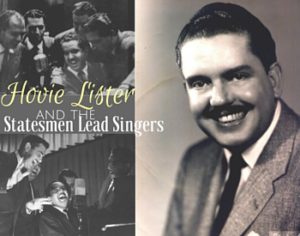 The Statesmen Quartet…..that mammoth name in gospel music. Even more than a decade since their disbandment, the name still evokes excitement. Hovie Lister worked, performed, thought, and dreamed larger than any of his contemporaries, and most likely, any of those who followed in the years to come. Hovie Lister WAS the Statesmen. Within just a few short years, he had the top male quartet in America, an accomplishment unheard of in the competitive world that was gospel music in the 40s and 50s. The story of Hovie Lister and the Statesmen Quartet has been covered many times, therefore an attempt to chronicle the complete history of their remarkable career would be rather redundant on my part. The sound of the lead singer dictates much of the sound aspects of any quartet, and the Statesmen were no exception to this rule either. Having said that, this month’s column will chronicle the impact of the Statesmen Quartet through the music of their lead vocalists, almost all of whom would impact gospel music in monumental fashion.
The Statesmen Quartet…..that mammoth name in gospel music. Even more than a decade since their disbandment, the name still evokes excitement. Hovie Lister worked, performed, thought, and dreamed larger than any of his contemporaries, and most likely, any of those who followed in the years to come. Hovie Lister WAS the Statesmen. Within just a few short years, he had the top male quartet in America, an accomplishment unheard of in the competitive world that was gospel music in the 40s and 50s. The story of Hovie Lister and the Statesmen Quartet has been covered many times, therefore an attempt to chronicle the complete history of their remarkable career would be rather redundant on my part. The sound of the lead singer dictates much of the sound aspects of any quartet, and the Statesmen were no exception to this rule either. Having said that, this month’s column will chronicle the impact of the Statesmen Quartet through the music of their lead vocalists, almost all of whom would impact gospel music in monumental fashion. The early months of the Statesmen were crucial in the lives and careers of two men who would become gospel music giants in the years ahead. Hovie found Mosie Lister (no relation) tuning pianos at Rich’s Department Store in Downtown Atlanta, and tapped him to be the original lead singer for his quartet. It didn’t take long for Mosie, a pleasant if never flashy vocalist, to decide that constant singing and travel was not for him. While only lead vocalist for the Statesmen for a couple of months, his musical influence would benefit the Statesmen for their entire career. Fueled by his desire to compose original music, so began the career of one of the greatest songwriters in gospel music. And with that, so furthered the career of one of the greatest gospel voices of all time.
The early months of the Statesmen were crucial in the lives and careers of two men who would become gospel music giants in the years ahead. Hovie found Mosie Lister (no relation) tuning pianos at Rich’s Department Store in Downtown Atlanta, and tapped him to be the original lead singer for his quartet. It didn’t take long for Mosie, a pleasant if never flashy vocalist, to decide that constant singing and travel was not for him. While only lead vocalist for the Statesmen for a couple of months, his musical influence would benefit the Statesmen for their entire career. Fueled by his desire to compose original music, so began the career of one of the greatest songwriters in gospel music. And with that, so furthered the career of one of the greatest gospel voices of all time. Jake Hess had a “sweet gig” with one of the top quartets of the day, The Melody Masters, in Lincoln, Nebraska. But Jake, anxious to return south near his family, sought out Hovie Lister’s fledgling quartet. Hovie was not completely sold on Jake’s voice, yet in what may have been a moment of divine intervention, hired Jake anyway. At the time, Jake had a beautiful melodic voice, but not yet compatible with the sound Hovie wanted for his quartet. Jake began developing a more distinct vocal styling, and, after patterning after voices like Bill Kenney of the Ink Spots and Fred Smith of the Melody Boys Quartet, became the focal point of the Statesmen’s commercial sound, and the standard for a gospel quartet lead singer. Precise enunciation, hand movement, facial expression, excitement, sincerity, and passion permeated Jake’s performances. “Faith Unlocks the Door”, “Climbing Higher and Higher”, “How Long Has It Been” and many others showcased this special voice. Though many attempted imitating his style, there was still only one Jake Hess.
Jake Hess had a “sweet gig” with one of the top quartets of the day, The Melody Masters, in Lincoln, Nebraska. But Jake, anxious to return south near his family, sought out Hovie Lister’s fledgling quartet. Hovie was not completely sold on Jake’s voice, yet in what may have been a moment of divine intervention, hired Jake anyway. At the time, Jake had a beautiful melodic voice, but not yet compatible with the sound Hovie wanted for his quartet. Jake began developing a more distinct vocal styling, and, after patterning after voices like Bill Kenney of the Ink Spots and Fred Smith of the Melody Boys Quartet, became the focal point of the Statesmen’s commercial sound, and the standard for a gospel quartet lead singer. Precise enunciation, hand movement, facial expression, excitement, sincerity, and passion permeated Jake’s performances. “Faith Unlocks the Door”, “Climbing Higher and Higher”, “How Long Has It Been” and many others showcased this special voice. Though many attempted imitating his style, there was still only one Jake Hess. Jake departed the Statesmen to open his piano store in 1956, and was replaced by Les Roberson. Roberson was with the quartet at the time of Denver Crumpler’s untimely death, and was only with the quartet long enough to record two singles (along with some rare concert recordings), therefore few are familiar with him. After nearly sixty years, Roberson’s contributions deserve a fair evaluation. A former baritone for the Weatherfords and Oak Ridge Quartet, Roberson possessed a broad, mellow, yet very commercial voice for the day. This was ideal for continuing the musical sound that had been centered around his predecessor. Roberson appears on four cuts from the Statesmen custom label. “My Heavenly Father Watches Over Me”, “These Are the Things That Matter”, and the Statesmens’ first recording of “I Wanna Know” are all well up to the high performance standards of the Statesmen, but Roberson’s shining moment is “I’m Living with Jesus”. Only one problem….many of the arrangements formed around Hess’s vocals were quite demanding for Roberson, and he found himself singing out of his range. His time with the group sadly came to an end within less a year. Fortunately, Jake Hess was again standing in the wings.
Jake departed the Statesmen to open his piano store in 1956, and was replaced by Les Roberson. Roberson was with the quartet at the time of Denver Crumpler’s untimely death, and was only with the quartet long enough to record two singles (along with some rare concert recordings), therefore few are familiar with him. After nearly sixty years, Roberson’s contributions deserve a fair evaluation. A former baritone for the Weatherfords and Oak Ridge Quartet, Roberson possessed a broad, mellow, yet very commercial voice for the day. This was ideal for continuing the musical sound that had been centered around his predecessor. Roberson appears on four cuts from the Statesmen custom label. “My Heavenly Father Watches Over Me”, “These Are the Things That Matter”, and the Statesmens’ first recording of “I Wanna Know” are all well up to the high performance standards of the Statesmen, but Roberson’s shining moment is “I’m Living with Jesus”. Only one problem….many of the arrangements formed around Hess’s vocals were quite demanding for Roberson, and he found himself singing out of his range. His time with the group sadly came to an end within less a year. Fortunately, Jake Hess was again standing in the wings. With Jake back in the lineup, along with the addition of Rosie Rozell in 1959, the Statesmen continued to flourish in the gospel music industry. Many of the group’s most exciting recordings, particularly their three live albums, were released during this period. Jake was sidelined briefly in 1962 by a bout with nephritis, during which young Gary McSpadden stepped in to fill his shoes. Aside from this brief sabbatical, things were business as usual for the top quartet of the day. Perhaps for Jake, things were a little too business as usual. The Statesmen had been taking the majority of their song catalog from their own publishing company, Faith Music, which Jake apparently became somewhat disenchanted by. Jake longed to form his own group. At the end of 1963, Jake Hess and the Imperials were formed, and it was the end of an era for the Statesmen Quartet.
With Jake back in the lineup, along with the addition of Rosie Rozell in 1959, the Statesmen continued to flourish in the gospel music industry. Many of the group’s most exciting recordings, particularly their three live albums, were released during this period. Jake was sidelined briefly in 1962 by a bout with nephritis, during which young Gary McSpadden stepped in to fill his shoes. Aside from this brief sabbatical, things were business as usual for the top quartet of the day. Perhaps for Jake, things were a little too business as usual. The Statesmen had been taking the majority of their song catalog from their own publishing company, Faith Music, which Jake apparently became somewhat disenchanted by. Jake longed to form his own group. At the end of 1963, Jake Hess and the Imperials were formed, and it was the end of an era for the Statesmen Quartet.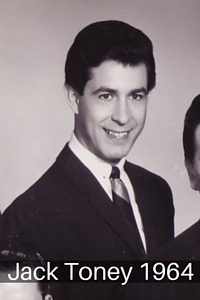 Jack Toney was young, tall, slender, and handsome, and, though not possessing Hess’s distinctive style, was arguably gospel music’s greatest all-around voice. Over the span of his fifty-plus year music career, Jack’s peers often commented that he seemed incapable of hitting a sour note. Jack’s signature “Beyond the Gates” not only proved him capable of carrying the mail with the Statesmen, but showcased his relaxed, effortless voice. Some of my very favorite Statesmen albums prominently feature Jack Toney’s remarkable vocals, particularly The Happy Sound of the Statesmen Quartet and All Day Singing and Dinner on the Ground. The demand of the Statesmen’s travels and family concerns necessitated Jack’s departure in 1966, but he would soon return.
Jack Toney was young, tall, slender, and handsome, and, though not possessing Hess’s distinctive style, was arguably gospel music’s greatest all-around voice. Over the span of his fifty-plus year music career, Jack’s peers often commented that he seemed incapable of hitting a sour note. Jack’s signature “Beyond the Gates” not only proved him capable of carrying the mail with the Statesmen, but showcased his relaxed, effortless voice. Some of my very favorite Statesmen albums prominently feature Jack Toney’s remarkable vocals, particularly The Happy Sound of the Statesmen Quartet and All Day Singing and Dinner on the Ground. The demand of the Statesmen’s travels and family concerns necessitated Jack’s departure in 1966, but he would soon return.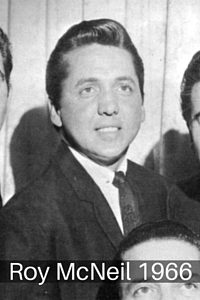 One of gospel music’s greatest song stylists, Roy McNeil, spent approximately a year as Statesmen lead vocalist. He had already made his mark on gospel music with his incredible high range, performing with The Rangers and The Prophets. Much like Jake Hess, McNeil had a way with a song. Two very pleasant Statesmen albums were released during McNeil’s time with the group, Gospel Gems and In Gospel Country. The albums just barely tap into the exciting potential of McNeil as Statesmen lead singer, had he remained with the quartet longer than he did. McNeil’s masterful performance of “You Must Make Up Your Mind Today” was the unquestionable highlight of his brief stint with the group.
One of gospel music’s greatest song stylists, Roy McNeil, spent approximately a year as Statesmen lead vocalist. He had already made his mark on gospel music with his incredible high range, performing with The Rangers and The Prophets. Much like Jake Hess, McNeil had a way with a song. Two very pleasant Statesmen albums were released during McNeil’s time with the group, Gospel Gems and In Gospel Country. The albums just barely tap into the exciting potential of McNeil as Statesmen lead singer, had he remained with the quartet longer than he did. McNeil’s masterful performance of “You Must Make Up Your Mind Today” was the unquestionable highlight of his brief stint with the group.  Jack Toney returned to the Statesmen in 1967 and the great music continued, but his return would be short-lived. At the end of 1968, he left the road once again. Following Jack’s departure, Don Butler filled in at the lead position until a permanent replacement was found. Armed with a big voice and powerful magnitude, Butler commanded lead, baritone, or even bass vocals, yet up until recently, I wondered how his deep voice matched with the Statesmen of this era. Recently I heard a rough concert recording from the Statesmen with Butler on lead vocals, and was blown away. Butler was bigger than life with the Statesmen, and would have been an outstanding hire. The energy was evermore there!
Jack Toney returned to the Statesmen in 1967 and the great music continued, but his return would be short-lived. At the end of 1968, he left the road once again. Following Jack’s departure, Don Butler filled in at the lead position until a permanent replacement was found. Armed with a big voice and powerful magnitude, Butler commanded lead, baritone, or even bass vocals, yet up until recently, I wondered how his deep voice matched with the Statesmen of this era. Recently I heard a rough concert recording from the Statesmen with Butler on lead vocals, and was blown away. Butler was bigger than life with the Statesmen, and would have been an outstanding hire. The energy was evermore there!H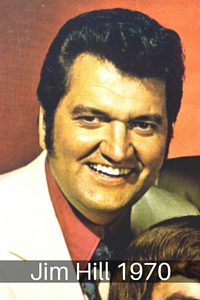 ovie chose “What a Day That Will Be” songwriter and charismatic stage dynamo Jim Hill for the lead position. If the Statesmen had lost any of their raw energy when Jake Hess left, they regained it with the addition of Hill. Jim Hill could wring the emotion of just about any lyric from the first note. Not only that, but the man would kick his feet chest high when in the Spirit! “God’s Not Dead” became the group’s new “sugar stick”, mainly attributed to Hill’s dynamic presentation.
ovie chose “What a Day That Will Be” songwriter and charismatic stage dynamo Jim Hill for the lead position. If the Statesmen had lost any of their raw energy when Jake Hess left, they regained it with the addition of Hill. Jim Hill could wring the emotion of just about any lyric from the first note. Not only that, but the man would kick his feet chest high when in the Spirit! “God’s Not Dead” became the group’s new “sugar stick”, mainly attributed to Hill’s dynamic presentation.
 ovie chose “What a Day That Will Be” songwriter and charismatic stage dynamo Jim Hill for the lead position. If the Statesmen had lost any of their raw energy when Jake Hess left, they regained it with the addition of Hill. Jim Hill could wring the emotion of just about any lyric from the first note. Not only that, but the man would kick his feet chest high when in the Spirit! “God’s Not Dead” became the group’s new “sugar stick”, mainly attributed to Hill’s dynamic presentation.
ovie chose “What a Day That Will Be” songwriter and charismatic stage dynamo Jim Hill for the lead position. If the Statesmen had lost any of their raw energy when Jake Hess left, they regained it with the addition of Hill. Jim Hill could wring the emotion of just about any lyric from the first note. Not only that, but the man would kick his feet chest high when in the Spirit! “God’s Not Dead” became the group’s new “sugar stick”, mainly attributed to Hill’s dynamic presentation.A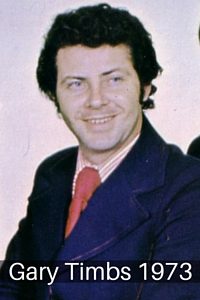 fter Hill’s departure in early 1973, Hovie attempted to update the Statesmen’s image and sound, but by this point, the Statesmen had too many hits on their hands, if there is such a problem. Statesmen fans didn’t want an updated sound, they wanted the tried-and-true sound that made them popular two decades earlier, and the Statesmen at this point more frequently found themselves returning to familiarity. Whichever case, Gary Timbs fit into either situation. Timbs possessed a soulful lead voice, and a “Jerry Lee Lewis” vocal and piano style that set him apart from all of his predecessors. At the same time, Timbs was completely capable of embracing the Statesmen classics in his own special way. After Timb’s departure in 1974, the Statesmen attempted updating their sound again with “Ten Thousand Years” writer Elmer Cole, but by this point, the Big Chief had passed away, and Hovie was tired and discouraged. Thus, the Statesmen Quartet folded in 1975.
fter Hill’s departure in early 1973, Hovie attempted to update the Statesmen’s image and sound, but by this point, the Statesmen had too many hits on their hands, if there is such a problem. Statesmen fans didn’t want an updated sound, they wanted the tried-and-true sound that made them popular two decades earlier, and the Statesmen at this point more frequently found themselves returning to familiarity. Whichever case, Gary Timbs fit into either situation. Timbs possessed a soulful lead voice, and a “Jerry Lee Lewis” vocal and piano style that set him apart from all of his predecessors. At the same time, Timbs was completely capable of embracing the Statesmen classics in his own special way. After Timb’s departure in 1974, the Statesmen attempted updating their sound again with “Ten Thousand Years” writer Elmer Cole, but by this point, the Big Chief had passed away, and Hovie was tired and discouraged. Thus, the Statesmen Quartet folded in 1975.
 fter Hill’s departure in early 1973, Hovie attempted to update the Statesmen’s image and sound, but by this point, the Statesmen had too many hits on their hands, if there is such a problem. Statesmen fans didn’t want an updated sound, they wanted the tried-and-true sound that made them popular two decades earlier, and the Statesmen at this point more frequently found themselves returning to familiarity. Whichever case, Gary Timbs fit into either situation. Timbs possessed a soulful lead voice, and a “Jerry Lee Lewis” vocal and piano style that set him apart from all of his predecessors. At the same time, Timbs was completely capable of embracing the Statesmen classics in his own special way. After Timb’s departure in 1974, the Statesmen attempted updating their sound again with “Ten Thousand Years” writer Elmer Cole, but by this point, the Big Chief had passed away, and Hovie was tired and discouraged. Thus, the Statesmen Quartet folded in 1975.
fter Hill’s departure in early 1973, Hovie attempted to update the Statesmen’s image and sound, but by this point, the Statesmen had too many hits on their hands, if there is such a problem. Statesmen fans didn’t want an updated sound, they wanted the tried-and-true sound that made them popular two decades earlier, and the Statesmen at this point more frequently found themselves returning to familiarity. Whichever case, Gary Timbs fit into either situation. Timbs possessed a soulful lead voice, and a “Jerry Lee Lewis” vocal and piano style that set him apart from all of his predecessors. At the same time, Timbs was completely capable of embracing the Statesmen classics in his own special way. After Timb’s departure in 1974, the Statesmen attempted updating their sound again with “Ten Thousand Years” writer Elmer Cole, but by this point, the Big Chief had passed away, and Hovie was tired and discouraged. Thus, the Statesmen Quartet folded in 1975. The Statesmen began accepting engagements again in 1977 with Hovie, Doy, Jake, and Rosie. Demand grew to such a point that by 1979 Hovie made an “overhaul” in personnel. Since the Statesmen were by this point a legendary name with thirty years of hits and signature songs under their belt, Buddy Burton was the perfect choice to capture their messages with his lead vocals. Buddy had a winning smile and a youthful energy that brought freshness to the Statesmen classics. He could sound much like Jake Hess, but possessed his own great voice. Jake Hess and Jack Toney each gave tremendous vocal performances on the song “Closer to Thee”, but in my opinion, Buddy Burton OWNED “Closer to Thee”.
The Statesmen began accepting engagements again in 1977 with Hovie, Doy, Jake, and Rosie. Demand grew to such a point that by 1979 Hovie made an “overhaul” in personnel. Since the Statesmen were by this point a legendary name with thirty years of hits and signature songs under their belt, Buddy Burton was the perfect choice to capture their messages with his lead vocals. Buddy had a winning smile and a youthful energy that brought freshness to the Statesmen classics. He could sound much like Jake Hess, but possessed his own great voice. Jake Hess and Jack Toney each gave tremendous vocal performances on the song “Closer to Thee”, but in my opinion, Buddy Burton OWNED “Closer to Thee”. 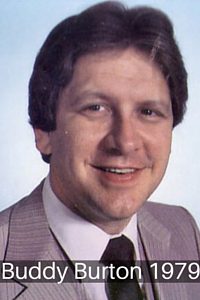 Buddy Burton was the last “new” lead singer Hovie hired for the Statesmen. The group disbanded once again upon the forming of supergroup The Masters V, but would return a decade later at the insistence of Bill Gaither. From 1991 until the final retirement of the Statesmen upon Hovie’s death in 2001, a Statesmen lead singing veteran traveled by Hovie’s side and anchored the group’s sound. Statesmen stalwarts Jake Hess, Jack Toney, and Buddy Burton all contributed their tremendous talents to Hovie’s final ten years on stage, once again reminding audiences of why the Statesmen were still the greatest and most influential quartet of all time. A Statesmen without Hovie Lister was inconceivable, yet Hovie’s lasting friendships with his lead vocalists (particularly Hess, Toney, Burton, and Mosie Lister) remain one of the greatest benchmarks of their legacy. Always talented and always dependable, these were the Statesmen Quartet lead singers!
Buddy Burton was the last “new” lead singer Hovie hired for the Statesmen. The group disbanded once again upon the forming of supergroup The Masters V, but would return a decade later at the insistence of Bill Gaither. From 1991 until the final retirement of the Statesmen upon Hovie’s death in 2001, a Statesmen lead singing veteran traveled by Hovie’s side and anchored the group’s sound. Statesmen stalwarts Jake Hess, Jack Toney, and Buddy Burton all contributed their tremendous talents to Hovie’s final ten years on stage, once again reminding audiences of why the Statesmen were still the greatest and most influential quartet of all time. A Statesmen without Hovie Lister was inconceivable, yet Hovie’s lasting friendships with his lead vocalists (particularly Hess, Toney, Burton, and Mosie Lister) remain one of the greatest benchmarks of their legacy. Always talented and always dependable, these were the Statesmen Quartet lead singers!